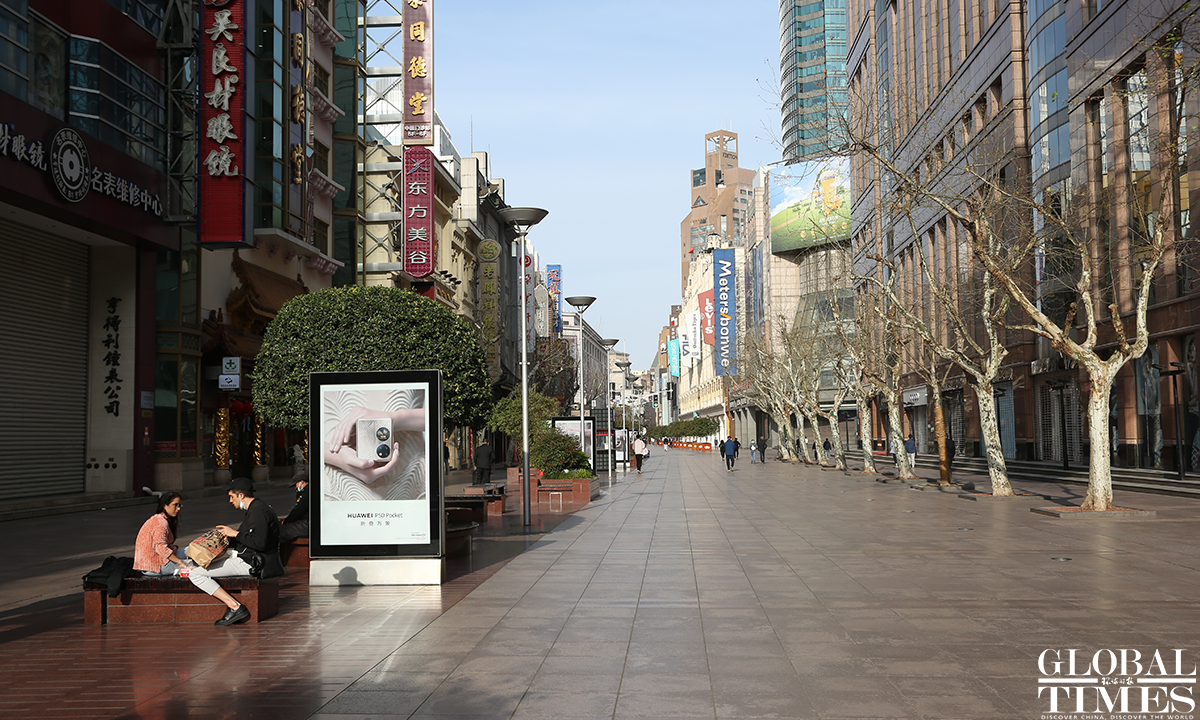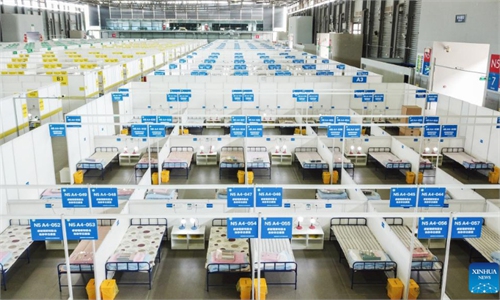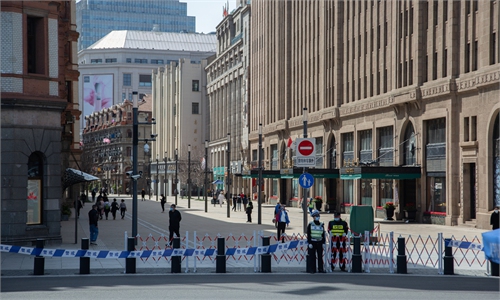Shanghai enters static management as cases keep surging; life necessity supplies and medical services for residents stressed: officials

The Nanjing Road, one of the world's busiest shopping streets, is almost empty. Photo: Shi Liu
Shanghai municipal government officials announced on Wednesday night to resort to static management of the whole city, carry out city-wide nucleic acid testing, so to round up risk groups and staunch viral infections within community as soon as possible.
Li Qiang, Shanghai's Party secretary, made the remarks at a video meeting, while describing Shanghai is now placed at the most difficult and key stage of COVID-19 battling, and every minute, every hour counts.
Three days after entering a partial sealing-off, Shanghai, the city with China's best medical and economic resources, is facing shortages of medical treatment and resources as the number of cases keeps surging, Global Times has learned earlier the day.
Responding those challenges, Li stressed to spare no efforts to enhance the city's nucleic acid testing capability, improve the construction and management of centralized treatment sites, while ensuring life necessity supplies and medical services for local residents.
Shanghai reported 326 confirmed cases, and another 5,656 silent carriers on Tuesday. The city's caseload has surpassed 20,000 so far this month. To curb the rapid spread of the virus, the Shanghai municipal government announced on Sunday a two-stage closed-off management of the city, with mass testing to be conducted until April 5 in the two halves, which are separated by the Huangpu River.
Shanghai officials said that a total of 9.1 million people were tested in the city's eastern district of Pudong as of Wednesday. Certain areas will undergo a second round of testing.
After the partial decision was announced, Chinese social media Sina Weibo was flooded with information and requests for help from non-COVID patients in Shanghai who have urgent needs for medical assistance. Hashtag "Shanghai seeks help during COVID-19 outbreak," which allows residents to post helpful information, was trending on the platform.
A total of 22 hospitals have suspended outpatient and other services by Wednesday. Shanghai is also ratcheting up the building of isolation venues to round up cases and close contacts.
Shanghai officials and grassroot workers are also mobilized to help people in need to get medical treatment. For example, a pregnant woman, who lives in Pudong and was stranded in Puxi, finally got a maternity test when the order was announced, The Legal Daily reported.
She reported the case to the police, who escorted her all the way back home and extended meticulous care. She said she was so touched by their assistance that she began to shake with tears.
Wu Jinglei, director of the Shanghai Health Commission, vowed at a Monday conference to guarantee people's needs for daily necessities, and the medical needs of non-COVID patients.
Medical workers in Shanghai are under great stress in dealing with the surging cases. "Our hospital has been operating under closed-loop management for about one week as one positive COVID-19 case was found," a doctor from a secondary-level public general hospital in the Pudong New Area told the Global Times on condition of anonymity on Wednesday.
The doctor said about 160 doctors from her hospital will go to work at temporary quarantine centers to treat mild and asymptomatic cases. The doctors at the frontline have been really working hard recently.
Shanghai health officials said on Wednesday that traditional Chinese medicine can help patients be discharged quicker from isolation points and hospitals, so this treatment is being extended widely in the city's designated hospitals for COVID-19 patients.
There were also complaints online saying that it is difficult to get food in Shanghai due to strict measures. Videos of people fighting for food on market shelves are also circulating online.
Yet the Global Times learned from several Shanghai residents that the some sealed-off compounds responded swiftly to patients who needed medical treatment and give out medicine to those in need.
Liu Chunhua, who lives in Minhang district, where a large number of cases was reported, said that her residential compound has a chat group where residents can send their needs and social workers act quickly to meet those demands.
Also on Wednesday, Shanghai's Municipal Commission of Commerce collected contacts of special nucleic acid testing points so that deliverymen, restaurants and other platforms can get quick tests and operate to guarantee the residents' life necessities.
Nationwide support has been pouring into Shanghai to help the financial hub recover. For example, a team of 2,000 nucleic acid testing personnel from neighboring Zhejiang and Jiangsu provinces arrived in Shanghai on Tuesday. Food from places such as Zhejiang and Yunnan is also pouring into Shanghai.
Shortages of food and other resources are inevitable once a city moves to adopt strict measures such as a wide-scale sealing-off, said Zhuang Shilihe, a renowned physician who pays close attention to COVID-19.
Zhuang noted that Shanghai, with a population of 24 million, shunned stringent measures like this before, to avoid just this scenario.
An anonymous expert from the Chinese Center for Disease Control and Prevention told the Global Times that Shanghai's medical system is on the verge of crashing. Yet with wide screening and strict measures in place, the caseload in Shanghai will increase in the next few days and drop after all the cases are rounded up and all strict measures are in place, said the anonymous expert.
He note that it is a "very difficult task for Shanghai" to see the case nosedive, and screen the whole city by April 5, the scheduled date to ease restrictions.
Yet epidemiologists believed with help from around the nation, Shanghai's dilemma will be greatly eased in a short time.



